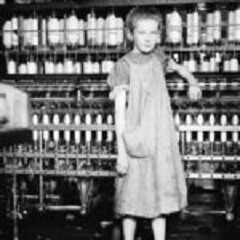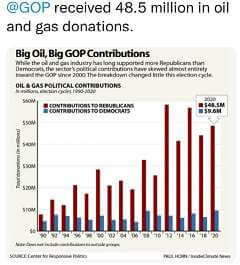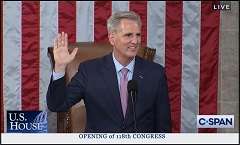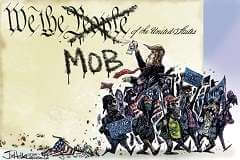Republicans push for teenagers as young as 14 to work in restaurants, industrial jobs
“NASHVILLE, Tenn. – In the past two years, lawmakers in at least 11 states have sought to loosen child labor laws to help employers fill empty jobs, even as federal officials and news investigations suggest that many minors working in manufacturing, meatpacking and construction jobs are being exploited or hurt.”
A conservative lobbying group is reportedly behind most state efforts to loosen child labor laws
“Several states are moving to roll back child labor protections, arguing that laws limiting where, when, and how long youths can work deprive teens of helpful job experience and tie the hands of parents. But much of this push is coming from a conservative Florida think tank, the Foundation for Government Accountability (FGA), and its lobbying arm, the Opportunity Solutions Project, The Washington Post reports. And the organization is having quite a bit of success among Republicans on the state level.
FGA-backed child labor legislation is advancing in Iowa, Missouri, Ohio, Minnesota, and Georgia this year. But the group’s “biggest victory” on this front so far was in Arkansas, helping design and push through a law that eliminates work permits and age verification for workers younger than 16, the Post reports. “That law passed so swiftly and was met with such public outcry that Arkansas officials quickly approved a second measure increasing penalties on violators of the child labor codes the state had just weakened.”
“The reason these rather unpopular policies succeed is because they come in under the radar screen,” David Campbell, professor of American democracy at the University of Notre Dame, tells the Post.
The Biden administration, which called relaxing state child labor laws “irresponsible” and dangerous for children, announced a crackdown on child labor violators in February. The Labor Department reports a 69 percent increase in minors illegally employed since 2018, the Post reports. “Some employers grappling with a tightening labor market and pressure from inflation have turned to younger workers, rather than increasing wages or benefits to attract older applicants.”
Kids are Dying all over the country!
Poultry plant’s “inaction” led to teenager’s death, feds say
“Lax safety standards led to a 16-year-old worker getting pulled into a machine at a poultry plant in Hattiesburg, Mississippi — the second fatality at the facility in just over two years, the Department of Labor said on Tuesday.
The teenage sanitation employee at the Mar-Jac Poultry processing plant died on July 14, 2023, after getting caught in a rotating shaft in the facility’s deboning area, according to the agency. Procedures to disconnect power to the machine and prevent it from unintentionally starting during the cleaning were not followed despite a manager supervising the area, federal safety investigators found.”
Police identify 16-year-old killed in an accident at a Lee’s Summit landfill Thursday
“Police said Hampton, an employee of the company that runs the landfill, had become pinned between a tractor-trailer rig and its trailer.”
The GOP wants kids to WORK, not LEARN
Indiana Bill Would Let 14-Year-Olds Drop Out to Work on a Farm
“If you thought we had mostly solved child labor in the United States, what transpired in state legislatures during 2023 should have absolved you of that notion. Already, 2024 isn’t looking much better.
On Monday, the opening day of Indiana’s legislative session, Republican Rep. Joanna King filed a bill that would allow kids as young as 14 to effectively drop out of school following 8th grade and go to work full-time on a farm. If the teenager “has been excused from compulsory school attendance after completing grade 8” and obtains their parents’ permission, they can work up to 40 hours a week all year round, including during school hours.”
Indiana Bill Would Allow Minors as Young as 14 to Quit School to Work on Corporate Farms
“This week, Indiana House Rep Joanna King (R. 49) introduced a bill that would allow children who have completed 8th grade to leave school and work full time on farms during school hours.
The bill, which again would allow actual children to work instead of going to school (checks watch, confirms it’s indeed 2023 and not a dark time in the early 20th century when children worked without legal protections), carves out legal definitions for “exempted minors” to work as farm labor. From the bill synopsis (you can slog through the actual language of this horror show here):
“Work exceptions for minors. Defines “exempted minor” for purposes of the law concerning employment of minors. Permits certain exempted minors to work at farm labor during school hours on a school day. Permits certain exempted minors to work during school hours on a school day with limitations.”
An exempted minor as defined by the bill is a child who “has been excused from compulsory school attendance after completing grade 8” and whose parent “submits to the minor’s current or prospective employer (A) a signed statement from the parent declaring that the minor has been excused from school after completing grade 8.”
So as long as a child gets an ok from a parent to quit school and work all the time, then it’s fine? Sure. God knows when I was 14 years old, I was plenty equipped to enter the adult workforce and advocate for myself and my family. By the way, the age of consent in Indiana is 16. If a child isn’t mature enough to consent to sexual conduct at 13 or 14, how are they mature enough to consent to permanently abandoning their education?
The bill surgically inserts permission to employ kids as domestic help and (sorry I just threw up in my mouth a little) golf caddies. Yup.
“A minor less than (1) fourteen (14) years of age may not be employed or allowed to work in any gainful occupation except as a farm laborer, domestic service worker, caddie for persons playing the game of golf, newspaper carrier; and (2) twelve (12) years of age may not be permitted to work at farm labor except on a farm operated by the minor’s parent.””
“This law follows a recent, disturbing trend of GOP lawmakers seeking to undermine child labor laws throughout the country. A similar bill introduced in Florida this week would allow 16-year-olds to drop out of school and work full time and Arkansas Governor Sarah Huckabee Sanders signed a bill into law that nullified work permit requirements for children as young as 14.
According to the Vox story (from last May), 10 states introduced “or enacted laws to change the rules governing teenage work requirements.”
If you know the history of the labor movement in this country, none of this, as galling and amoral as it is, is shocking. Corporations have always opposed labor laws, and are using recent labor shortages as a guise to gut those protections even more. From Vox, these laws are “rooted in longstanding conservative opposition to workplace regulation, and some labor advocates worry they’re just the opening salvo to a broader attack on government safety rules.”
Incidentally, Rep. King is so concerned about guardrails protecting those same children she thinks should work full time, she introduced (including a host of anti-trans legislation) a bill that would prohibit minors from using any social media platform without written consent of their parents.“
They Voted for It!
Legislative panel votes to ease youth employment restrictions, proposes allowing 14-year-olds to work during school hours
“INDIANAPOLIS — A House employment committee voted 8-3 Thursday to ease several child labor laws, including allowing youth as young as 14 to work during school hours with parental permission.”
This:
Follow The Money!
The conservative campaign to rewrite child labor laws
“The Foundation for Government Accountability, a Florida-based think tank and lobbying group, drafted state legislation to strip child workplace protections, emails show”
“When Iowa lawmakers voted last week to roll back certain child labor protections, they blended into a growing movement driven largely by a conservative advocacy group.
At 4:52 a.m., Tuesday, the state’s Senate approved a bill to allow children as young as 14 to work night shifts and 15 year-olds on assembly lines. The measure, which still must pass the Iowa House, is among several the Foundation for Government Accountability is maneuvering through state legislatures.
The Florida-based think tank and its lobbying arm, the Opportunity Solutions Project, have found remarkable success among Republicans to relax regulations that prevent children from working long hours in dangerous conditions. And they are gaining traction at a time the Biden administration is scrambling to enforce existing labor protections for children.
The FGA achieved its biggest victory in March, playing a central role in designing a new Arkansas law to eliminate work permits and age verification for workers younger than 16. Its sponsor, state Rep. Rebecca Burkes (R), said in a hearing that the legislation “came to me from the Foundation [for] Government Accountability.””
US History:
2023!!!
The Horrifying and Shameful Return of Child Labor
“Child labor now has to be added to this list of resurgent horrors. “Migrant children, who have been coming into the United States without their parents in record numbers, are ending up in some of the most punishing jobs in the country,” writes journalist Hannah Dreier, in an in-depth investigation published by The New York Times last month.”
Labor department uncovers kids working at Minnesota meat-packing plants
“MINNEAPOLIS — Federal investigators say they have uncovered underage kids working dangerous jobs at Minnesota meat-packing plants.
The Labor Department went to court to stop what it calls “oppressive child labor” violations.
Investigators say they found more than 30 teenagers working overnight shifts. Their jobs included cleaning dangerous equipment.
One 13-year-old suffered chemical burns.
The kids all worked for a sanitation company in Minnesota and Nebraska.”
Company hired same ‘known minor’ twice to clean slaughterhouses, internal document shows
“An internal company report shows Packers Sanitation Services Inc. disciplined an employee who hired the same “known minor” twice under two different identities.”
A company that the Labor Department says used more than 100 children to clean slaughterhouses hired the same child twice under different names, an internal company document shows.
Instead of paying adults more, some states might let companies hire kids as young as 14 to fill the labor shortage
- “Republicans in some states are proposing exceptions to child labor regulations.
- That’s because the labor shortage has impacted industries like meatpacking and construction.
- Research shows that those industries could attract adult workers if they increased pay and benefits.”
Arkansas Gov. Sanders signs a law that makes it easier to employ children
“Arkansas Gov. Sarah Huckabee Sanders signed a law this week rolling back requirements that the state verify the ages of workers under 16 and provide them with work certificates permitting them to work.
Effectively, the new law signed by the Republican governor applies to those who are 14 and 15 years old because in most cases Arkansas businesses can’t employ those under 14.
Under the Youth Hiring Act of 2023, children under 16 don’t have to get the Division of Labor’s permission to be employed. The state also no longer has to verify the age of those under 16 before they take a job. The law doesn’t change the hours or kinds of jobs kids can work.”
The good and the bad of Iowa’s bill that would bring big changes to child labor laws
“New section allows for exemptions
In an entirely new section, however, the bill would allow the Iowa Workforce Development and state Department of Education heads to make exceptions to any of the prohibited jobs for teens 14-17 “participating in work-based learning or a school or employer-administered, work-related program.”
It says those asking for exceptions must demonstrate “the activity will be performed under adequate supervision and training;” that “the training includes adequate safety precautions;” and that “the terms and conditions of the proposed employment will not interfere with the; and health, well-being, or schooling of the minor enrolled in an approved program.”
Bill also would shield businesses from liability
The bill exempts businesses from civil liability if a student is sickened, injured or killed due to the company’s negligence. A business also would be free of civil liability if a student is hurt because of the teen’s negligence on the job — or is injured traveling to or from work.
Serving alcohol, driving to work, late hours
The bill in addition would allow 16- and 17-year-olds with the written permission of a parent, legal custodian or guardian to serve alcohol to people who are drinking it on the premises of a business.
It would some children under 16 to drive themselves to work-based programs. The Iowa Department of Transportation says online a student must be 14 1/2 years old to obtain a special driver’s license.
And it would let kids under 16 work until 9 p.m. instead of quitting by 7 p.m. And quitting time would be extended to 11 p.m. from June 1 through Labor Day.”
US History:
These Photos Ended Child Labor in the US
“In the year 1900, the US Federal Census revealed that there were 1.75 million children younger than 16 that were employed and working jobs across the country in places such as farms, mills, factories, and mines.
The non-profit National Child Labor Committee wanted to raise public awareness on this issue, so it hired American sociologist and photographer Lewis Wickes Hine to travel across the country and use his camera to document the plight of the working children, some of whom were as young as 4.”
Teaching With Documents: Photographs of Lewis Hine: Documentation of Child Labor
““There is work that profits children, and there is work that brings profit only to employers. The object of employing children is not to train them, but to get high profits from their work.” — Lewis Hine, 1908
After the Civil War, the availability of natural resources, new inventions, and a receptive market combined to fuel an industrial boom. The demand for labor grew, and in the late 19th and early 20th centuries many children were drawn into the labor force. Factory wages were so low that children often had to work to help support their families. The number of children under the age of 15 who worked in industrial jobs for wages climbed from 1.5 million in 1890 to 2 million in 1910. Businesses liked to hire children because they worked in unskilled jobs for lower wages than adults, and their small hands made them more adept at handling small parts and tools. Children were seen as part of the family economy. Immigrants and rural migrants often sent their children to work, or worked alongside them. However, child laborers barely experienced their youth. Going to school to prepare for a better future was an opportunity these underage workers rarely enjoyed. As children worked in industrial settings, they began to develop serious health problems. Many child laborers were underweight. Some suffered from stunted growth and curvature of the spine. They developed diseases related to their work environment, such as tuberculosis and bronchitis for those who worked in coal mines or cotton mills. They faced high accident rates due to physical and mental fatigue caused by hard work and long hours.”
Child Labor
“Child labor, or the use of children as workers, servants and apprentices, has been practiced throughout most of human history, but reached its zenith during the Industrial Revolution. Miserable working conditions including crowded and unclean factories, a lack of safety codes and long hours were the norm. Children could be paid less and were less likely to organize into unions. Working children were typically unable to attend school, creating a cycle of poverty that was difficult to break. Nineteenth century reformers and labor organizers sought to restrict child labor and improve working conditions to uplift the masses, but it took the Great Depression—a time when Americans were desperate for employment—to shake long-held practices of child labor in the United States.”
History of child labor in the United States—part 1: little children working
“There was a time in this country when young children routinely worked legally. As industry grew in the period following the Civil War, children, often as young as 10 years old but sometimes much younger, labored. They worked not only in industrial settings but also in retail stores, on the streets, on farms, and in home-based industries. This article discusses the use of child labor in the United States, concentrating on the period after the Civil War through the rise of the child labor reform movement.
The golf links lie so near the mill
That almost every day
The laboring children can look out
And see the men at play.1—Sarah N. Cleghorn“
Some people saw this as being wrong,
History of child labor in the United States—part 2: the reform movement
“As progressive child labor reformers gained traction during the last quarter of the 19th century, efforts expanded at the state level to outlaw the employment of small children. The move toward state-level reforms proved challenging. Many states, particularly in the South, resisted the effort. Frequently, child labor law opponents denied the problem existed and aggressively extolled the virtues of children in the workplace. This foiled the goal of achieving uniform laws across the country through state action. The failures at the state level caused many reformers by the early 1900s to believe that a federal law might be the best option. The limited role of the federal government under the Constitution, however, made such a prospect difficult. Many constitutional experts, Congressmen, and Presidents believed such a law was unconstitutional. In the face of widespread public support for curtailing child labor, a law based on the Commerce Clause of the Constitution—giving Congress the authority to regulate commerce between states or with foreign nations—was passed in 1916. This article concentrates on the reform movement up through the passage of that law.
I am glad to see there is going to be a meeting here for child labor. I am really tired of seeing so many big children ten years old playing in the streets.1—Prominent lady citizen
Don’t take these boys away from us! We have just bought these uniforms, and they were made to order.2—Shopkeeper in Cleveland, Ohio
There is a street in Lawrence, MA, named Camella Teoli Way. To know the story of how that street came to be named is to know the story of a struggle. The struggle of Camella Teoli is one of a young Italian immigrant who started work in a mill and ultimately spoke before Congress.3 Teoli’s struggle is a battle against child labor.4“
1938:
Fair Labor Standards Act of 1938: Maximum Struggle for a Minimum Wage
“On Saturday, June 25, 1938, to avoid pocket vetoes 9 days after Congress had adjourned, President Franklin D. Roosevelt signed 121 bills. Among these bills was a landmark law in the Nation’s social and economic development — Fair Labor Standards Act of 1938 (FLSA). Against a history of judicial opposition, the depression-born FLSA had survived, not unscathed, more than a year of Congressional altercation. In its final form, the act applied to industries whose combined employment represented only about one-fifth of the labor force. In these industries, it banned oppressive child labor and set the minimum hourly wage at 25 cents, and the maximum workweek at 44 hours.1:




